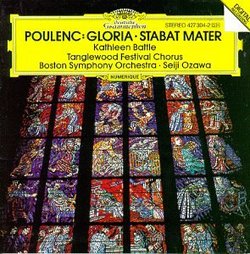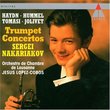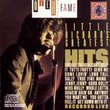| All Artists: Francis Poulenc, Seiji Ozawa, Boston Symphony Orchestra, Kathleen Battle Title: Poulenc: Gloria; Stabat Mater Members Wishing: 1 Total Copies: 0 Label: Deutsche Grammophon Release Date: 7/20/1989 Genre: Classical Styles: Opera & Classical Vocal, Symphonies Number of Discs: 1 SwapaCD Credits: 1 UPC: 028942730427 |
Search - Francis Poulenc, Seiji Ozawa, Boston Symphony Orchestra :: Poulenc: Gloria; Stabat Mater
 | Francis Poulenc, Seiji Ozawa, Boston Symphony Orchestra Poulenc: Gloria; Stabat Mater Genre: Classical
|
Larger Image |
CD DetailsSimilar CDs
Similarly Requested CDs
|
CD ReviewsEveryone is right... 09/18/2003 (4 out of 5 stars) "The reviewer who was disappointed that Battle sings a relatively short (but critically important) part in this music is correct. She sings the part the Poulenc wrote, afterall! The listener who was disappointed that the choir was out-volumed by the orchestra in this recording was also correct. The choir should have been given more volume in the final mix. Although I wish the choir did have a stronger part in the final outcome (volume wise), I wrote this blurb to let those interested in the best recorded version of this music on cd, that NOTHING ELSE in the amazon Poulenc catalog for these two compositions comes even remotely close to matching the fine orchestral performance, conducting and engineering of this recording. The dynamics, tempi, and overall glorious interpretation of the music on this cd is absolutely exhilirating. Something I'm sure Poulenc would appreciate." Probably the best recording of the gloria jim collins | NY USA | 10/09/2005 (5 out of 5 stars) "This is the simply a slpendid recording- well paced, energetic and in excellent sound. I have a suspicion that many people drawn to these works pay undo emphasis on the choir [or they are choir singers] and understandably get frustrating when the choir is not front and center in the musical proceedings. But what Poulenc wrote here does not emphasize the choir [he was a master instrumentalist after all!] so the orchestra should be more prominent at times. Ragardless, this is a great performance!" Where's the choir? Jessica Hall | Hoover, Alabama United States | 10/08/2002 (3 out of 5 stars) "These are both powerful choral works. However, the choir tends to be overpowered by the orchestra in this recording. The subtle intricacies of Poulenc's choral writing are often inaudible...and missed. Another recording would be a better choice, though these are works that should be a part of your music library."
|

 Track Listings (18) - Disc #1
Track Listings (18) - Disc #1







